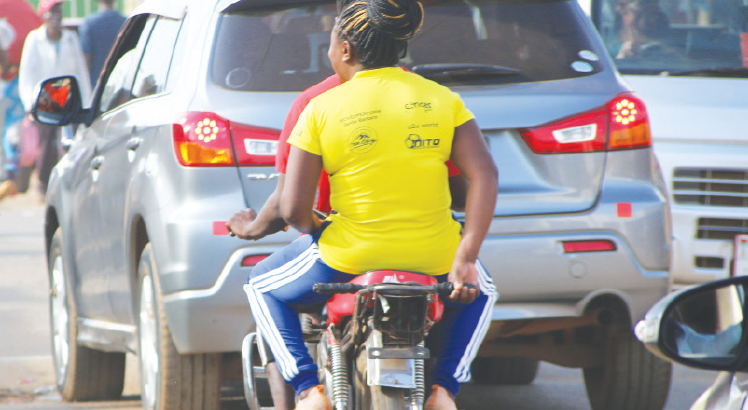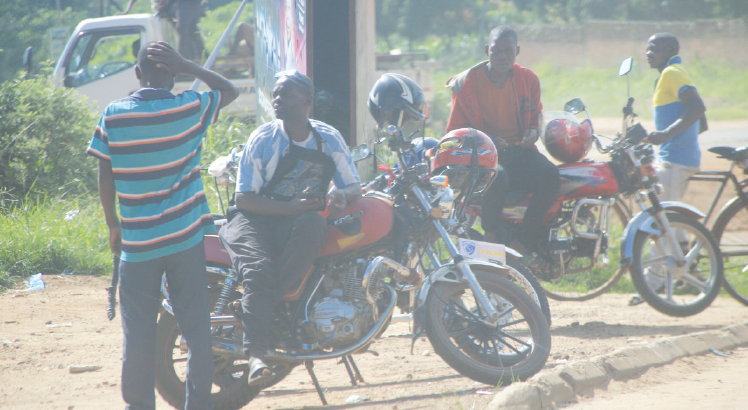Kabazas getting away with murder
Kabaza, long seen as a solution to youth unemployment and transportation woes, has morphed into the nation’s deadliest killer machine—with politicians and law enforcers acting as enablers, Nation on Sunday investigations reveal.
Statistics from the Department of Road Traffic and Safety Services (DRTSS) show that between 2020 and 2023, Malawi registered 4 566 kabaza-related accidents that caused 472 deaths.
This translates to 118 fatalities annually or 10 per month from the accidents that DRTSS—in its report to Parliament last December—said had doubled since 2017.
Most motorcyclists are not trained to be licensed, operate without protective gear such as helmets; their motorcycles are usually overloaded and unregistered, according to the department.
Law enforcement on the kabaza business is virtually non-existent.
Our undercover investigations show that not only do the law enforcers allow the kabaza operators to ply the roads illegally, but they also let them get away with lawlessness.
On February 15 and 16, a Nation on Sunday team camped at Town Hall Roundabout in Area 3, a stone’s throw from Lilongwe Police Station.
We also stationed ourselves along Paul Kagame Highway, M1 and Kaunda Road in the capital city.

In all these spots, we captured on camera kabaza riders without helmets and carrying more passengers than they should, waltzing through police check points without hindrance.
Some were ignoring traffic rules by overtaking other vehicles on the wrong side.
We made similar observations in Mponela as well as Salima.
We also gathered video and photographic evidence of similar violations in Mzuzu while our correspondents in Karonga, Zomba and Mangochi also captured kabaza operators disregarding traffic rules in view of police officers.
According to the DRTSS report to the Parliamentary Committee on Health we have seen, barrier to effective law enforcement on kabaza is political interference.
The report did not elaborate and the department has not responded to us after sending them a questionnaire.
But in 2021, after the police launched a clean-up campaign of illegal kabaza operators and confisticated thousands of motorcycles, the then minister of Homeland Security Richard Chimwendo Banda intervened. He facilitated the release of the motor vehicles and gave the operators six months (July to December) to register them with Malawi Revenue Authority (MRA).
During the moratorium, owners were also required to register their motorcycles and process their driving licences with DRTTS.
More than three years later, there has been little movement on the matter.
MRA spokesperson Steve Kapoloma has not responded to our questionnaire on whether the moratorium changed anything. DRTSS spokesperson Angella Makwecha too has not responded to our questionnaire.
But apart from rhetorical indignations, politicians from State House, Parliament and Capital Hill have failed to act decisively, especially on registration of motorcycles and enforcement of legal requirements.
In August 2022, during his tour of the Orthopaedic Department at Kamuzu Central Hospital (KCH), President Lazarus Chakwera Chakwera said he was concerned to learn that 75 percent of the cases at the time were from Kabaza-related crashes.
The President said there was need for the country to start regulating motorcycles to reduce road accidents.
Last November Parliamentary Committee on Health chairperson Mathews Ngwale, who is also Chiradzulu West parliamentarian, tabled a motion in the august House aimed at curbing the rising number of kabaza accidents.
The DRTSS report to Parliament conceded that what they have registered is far below the number of motor cycles operating in the country.
Reads the report: “The figures above show only motorcycles that have been registered under DRTSS. There are many motorcycles still operating without being registered and the total number of motorcycle population in the country is higher than the reported.”
Records from DRTSS show that as of September 2023, about 115 400 motorcycles were registered in their system (MaLTIS).
But Kabaza Association national chairperson Moses Mwalabu said in an interview there are 2 578 909 operators in their register. This means 95 percent or over 2 400 000 operators are unregistered.
Yet, according to the Ministry of Health, accidents from the unregulated motorcycles “result in multiple high energy injuries in need of advanced treatment.”
In fact, kabaza accidents have become so frequent and so severe that a whole unit at Kamuzu Central Hospital (KHC) has been informally named after the lethal transport mode.
Visit to ‘Kabaza Unit’

A visit last month to KCH’s newly-opened Lilongwe Institute of Orthopaedic and Neurosurgery (Lion) unit, where severe injuries are referred to, brings one face-to-face with the trauma of the unregulated motorcycles.
The nurses have nicknamed this unit ‘Kabaza Hospital’ because of the high percentage of victims of motorcycle-related accidents.
According to Lion medical director Dr. Boston Munthali, 30 percent of the injuries that come to the unit are from kabaza, which he said also accounts for 28 percent of patients with long stays —ranging from weeks to months.
“It is a huge strain on our resources. We had to construct this hospital because at KCH there was not enough space; we competed for the same space with other cases, but here it is about severe injuries; internal or open.
“We have 72 beds, but we admit double this number largely due to kabaza accidents,” said Dr. Munthali in an interview, which took place right in the wards that had some patients’beds in corridors on February 16 2024.
We randomly spoke to 10 patients in both the male and female wards, nine of whom were kabaza victims referred to the facility from different parts of the Central Region.
Esmie Kalitawo, who was referred from Ntchisi District Hospital, narrated her ordeal.
“It was on a Sunday when my husband and I were on our motorbike from church going home when a speeding kabaza operator with two passengers hit our motorcycle,” said Kalitawo, a teacher with 30 years of service who suffered a broken leg.
“My husband is also nursing an injury back home with a PoP [plaster of Paris],” she added.
Kalitawo said the operator who hit them seemed drunk and also got injured alongside a passenger, both of whom were taken to the district hospital.
In the male ward, Issa Kazembe, a kabaza operator himself, is among those stationed in the corridor for lack of space. He was referred from Salima District Hospital where he had been admitted since December last year.
“I crashed with another kabaza operator whose motorcycle did not have lights and we both got injured,” explained the father of four who sustained a broken leg and arm.
Kazembe, who confessed that he does not have a licence to operate a motorcycle, said he was pushed into the trade to weather economic hardships.
Kalitawo, the injured female teacher recovering at Lion, wants law enforcers to strictly deal with kabaza operators that are causing so much harm.
But what if the law enforcers themselves form the majority of those needing to be policed?
Because that is what a study published last August and commissioned by a United Kingdom-funded non-governmental organisation Traction, appears to show.
The report established that 70 percent of kabaza motorcycles belong to the working class, especially from Malawi Police Service, Malawi Defence Force officers and politicians such as legislators and councillors, making it difficult to enforce the law.
Road Safety Alert Foundation executive director Joel Jere said ownership of motorcycles is compromising law enforcement.
“They do not just fail to implement the law out of negligence, but the issue of ownership is at play here,” he said, adding that lack of political will is another cause of the kabaza chaos.
He added: “Politicians want political mileage at every opportunity and, therefore, they do not want to act on this for fear of antagonising this constituency.”
Responding to our questionnaire, National Police spokesperson Peter Kalaya said they are not looking away from kabaza, but that it is not practical to take to task every law breaking motorcyclist.
Kalaya claimed: “If you go to our stations such as Area 3 in Lilongwe, Mzuzu or Karonga, you will find motorcycles that have been seized because some did not follow the law. We have so many fines every day. The fact that one or two evade the checkpoint should not lead to a conclusion that we are not enforcing the law”.
The police publicist also indicated that there are many unregistered motorcycle taxis; hence, it is difficult to track them when they violate the law.
Asked why the unregistered motorcycles are allowed to operate freely, Kalaya said DRTSS is better placed to respond to this issue.
On her part, DRTSS spokesperson Makwecha is yet to respond to our questionnaire.





